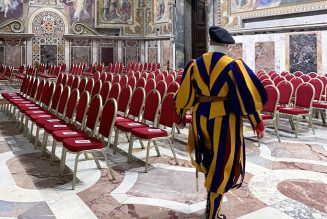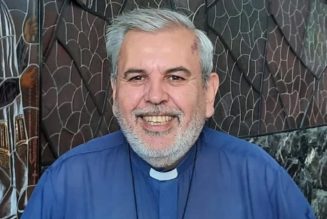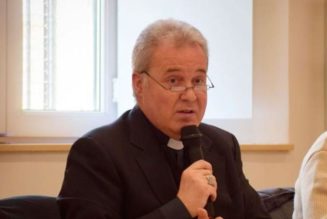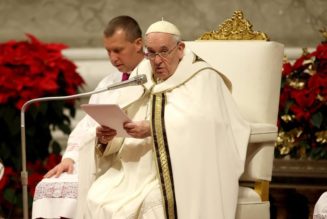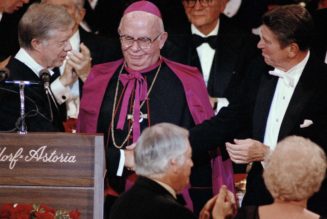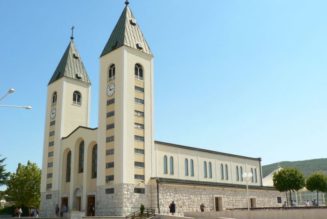
Jerome–often called “the greatest of the doctors of the Church”–once wrote: “He who is united to the Chair of Peter is one with me” (Ep.16, 2). In turn, throughout history, various popes have honored him. Today, Pope Francis took up that tradition.
It was announced this morning that Francis has released an Apostolic Letter, Scripturae Sacrae Affectus, devoted to Jerome. As Francis observes, his is not the first papal letter to celebrate the saint. In 1920, Benedict XV wrote an encyclical letter, Spiritus Paraclitus, to mark the fifteenth centenary of his death. Likewise, on Jerome’s feast in 2010, Francis’ predecessor, Benedict XVI, published Verbum Domini, which offered an especially detailed look at biblical study and its ecclesial significance. This year marks the 1600th anniversary of his death.
WHY JEROME?
Why is Jerome often treated as the greatest of the ancient doctors? Papal letters are not frequently written to commemorate the deaths of other great saints in history like this, which prompts the question: What makes him so special? Is the unique attention given to him due to his obvious Christ-like demeanor?
Not quite.
Jerome is famous for his irascible and curmudgeonly style. His personality was captured well by Phyllis McGinley:
God's angry man, His crotchety scholar, Was Saint Jerome, The great name-caller, Who cared not a dime For the laws of libel And in his spare time Translated the Bible. Quick to disparage All joys but learning, Jerome thought marriage Better than burning; But didn't like woman's Painted cheeks Didn't like Romans, Didn't like Greeks, Hated Pagans For their Pagan ways, Yet doted on Cicero all his days. A born reformer, cross and gifted, He scolded mankind Sterner than Swift did; Worked to save The world from the heathen; Fled to a cave For peace to breathe in, Promptly wherewith For miles around He filled the air with Fury and sound. In a mighty prose For almighty ends, He thrust at his foes, Quarreled with his friends, And served his Master, Though with complaint. He wasn't a plaster Sort of saint. But he swelled men's minds With a Christian leaven. It takes all kinds To make a Heaven. --Phyllis McGinley, Times Three (Penguin Books, 1961)
What made Jerome so important, then?
The answer is clear: his love for Scripture. Jerome’s name has become synonymous in Catholic tradition with devotion to biblical studies.
With that in mind, I want to highlight a few nuggets from Pope Francis’ new letter.
ON THE NEED FOR SKILLED INTERPRETERS
Francis writes:
Many, even among practising Christians, say openly that they are not able to read it (cf. Is 29:12), not because of illiteracy, but because they are unprepared for the biblical language, its modes of expression and its ancient cultural traditions. As a result the biblical text becomes indecipherable, as if it were written in an unknown alphabet and an esoteric tongue.
–Pope Francis, Scripturae Sacrae Affectus
This requires some attention. First, Francis claims that many Christians are unable to understand Scripture because they are not familiar with various biblical expressions. They also have an insufficient understanding of the ancient cultures out of which the Bible emerged. Coming to the Bible without this knowledge makes the it seems foreign. Francis even uses the word, “indecipherable.”
For Pope Francis, situating the text against its ancient backdrop is absolutely necessary for proper interpretation. This is no novel idea. In fact, it is deeply rooted in the tradition. Augustine, Aquinas, not to mention more recent ecclesiastical writers such as Pope Leo XIII all make this point: one cannot read Scripture without trying to understand its historical context. This notion was underscored at the Second Vatican Council.
Yet there is simply so much to know. The lay faithful cannot be expected to become experts themselves on all of these matters. Francis, therefore, talks about the need for guides:
This shows the need for the mediation of an interpreter, who can exercise a ‘diaconal’ function on behalf of the person who cannot understand the meaning of the prophetic message. Here we think of the deacon Philip, sent by the Lord to approach the chariot of the eunuch who was reading a passage from Isaiah (53:7-8), without being able to unlock its meaning. ‘Do you understand what you are reading?’ asked Philip, and the eunuch replied: ‘How can I, unless someone guides me?’ (Acts 8:30-31).
–Pope Francis, Scripturae Sacrae Affectus
Francis explains that, as the story of the eunuch in Acts shows, one cannot properly understand Scripture without a skilled interpreter. For Francis, this means we ought to learn from those who do have such knowledge. To whom should we turn? Francis points to Jerome as an exemplar:
Jerome can serve as our guide because, like Philip (cf. Acts 8:35), he leads every reader to the mystery of Jesus, while responsibly and systematically providing the exegetical and cultural information needed for a correct and fruitful reading of the Scriptures. In an integrated and skilful way he employed all the methodological resources available in his day – competence in the languages in which the word of God was handed down, careful analysis and examination of manuscripts, detailed archeological research, as well as knowledge of the history of interpretation – in order to point to a correct understanding of the inspired Scriptures.”
–Pope Francis, Scripturae Sacrae Affectus
Moreover, Jerome is a “model” for others who might serve as interpreters. What must interpreters learn from him? Notice that Francis underscores the need for an “integrated” reading. Jerome not only knew the history of interpretation–e.g., ecclesiastical writers before him–he also knew biblical languages, textual criticism (“careful analysis and examination of manuscripts”), and archaeology (such as it was in his day). All of these things are necessary for “correct understanding of the inspired Scriptures.”
SCRIPTURE STUDY AND PREACHING
I am deeply grateful for priests. I understand that parishes are sometimes understaffed and that priests are often overworked. Time is often a rare commodity. That said, as Francis observes, Jerome would have little patience with priests who can make no time for careful study.
“. . . the word of the priest must be flavoured by the reading of Scripture. I do not wish that you be a disclaimer or charlatan of many words, but one who understands the sacred doctrine (mysterii) and knows deeply the teachings (sacramentorum) of your God. It is typical of the ignorant to play around with words and to garner the admiration of inexpert people by speaking quickly. Those who are shameless often explain that which they do not know and pretend to be a great expert only because they succeed in persuading others”.
–Jerome, Ep. 52.8
As a Catholic Bible scholar, sitting through homilies can sometimes be difficult–you can tell when the priest is trying to “wing it.” In some cases, Scripture is left behind entirely. Rather than explaining what was just read–and often the congregation is wondering about the meaning of something they just heard read–the homilist takes a detour and a substitute story is told (two, if you include the now cliché opening joke). It could be a personal anecdote, an episode from the life of a saint, or even an excerpt from a book like Chicken Soup for the Soul (sorry, I am not providing a link). Either way, the message here is clear: “The Bible isn’t good enough. I’ve got something better to talk about.”
Other times, when the homilist actually does mention something from the lectionary reading, the commentary is rushed. It even sometimes includes false information. We might call these “pulpit fictions.” They may “preach well,” but they are not true. Some repeat offenders:
- The high priest wore a rope around his ankle prior to going into the Holy of Holies so that if he died in the sanctuary his corpse could be removed. (There is no ancient evidence for this.)
- The shepherds in the fields at the time of Jesus’ birth were actually tending to the sacrificial lambs offered on Passover. (This is speculation.)
- Mary and Joseph went around trying to check into hotels in Bethlehem, but ended up in a stable. (Actually, the word sometimes translated “inn” in Luke 2:7 does not mean hotel. The word used for the “inn” in the Good Samaritan story in Luke 10:34 is a different word.)
- When Jesus spoke of the difficulty of a rich man passing through “the eye of the needle” he was referring to a narrow gate or road. (There is no evidence that a gate or road existed in Jesus’ day with that name. Examples often given actually post-date the New Testament by many centuries.)
- Agapē referred to some sort of special love in Greek. (Nope. See this post.)
- The father of the Prodigal Son shamed himself by running to his son because this would have been viewed as an undignified action in the first-century Jewish world. (For heaven’s sake, stop it. This smacks of anti-Semitism. As if Jews were so obsessed with social reputation they failed to show emotion. They were not proto-Vulcans. Go read Tobit. Or Genesis. Or, like, the Bible.)
These factoids are continually passed on because preachers fail to investigate their authenticity prior to sharing them from the pulpit. They just keep getting repeated. Maybe if we pay attention to Francis–and Jerome!–some of these can be put to rest.
ON SCRIPTURE AND ECCLESIAL COMMUNION
Francis goes on to talk about how ecclesial communion must be rooted in a reading of Scripture that seeks the Spirit’s guidance.
As an enterprise carried out within the community and at the service of the community, Jerome’s scholarly activity can serve as an example of synodality for us and for our own time. . . The basis of such communion is Scripture, which we cannot read merely on our own: “The Bible was written by the People of God for the People of God, under the inspiration of the Holy Spirit. Only in this communion with the People of God can we truly enter as a ‘we’ into the heart of the truth that God himself wishes to convey to us’ [Benedict XVI, Verbum Domini §30].”
–Pope Francis, Scripturae Sacrae Affectus
Going on, Francis underscores Jerome’s commitment to learn from others himself. In particular, Jerome was devoted to the chair of Peter.
At a turbulent time in which the seamless garment of the Church was often torn by divisions among Christians, Jerome looked to the Chair of Peter as a sure reference point. “As I follow no leader save Christ, so I communicate with none but Your Holiness, that is, with the Chair of Peter. For this, I know, is the rock on which the Church is built” [Ep.15, 1]. At the height of the controversy with the Arians, he wrote to Damasus: “He that does not gather with you scatters; he that is not of Christ is of antichrist” [Ep.15, 2]. Consequently Jerome could also state: “He who is united to the Chair of Peter is one with me” [Ep.16, 2].
–Pope Francis, Scripturae Sacrae Affectus
For Jerome, departing from ecclesial communion was unthinkable. Christ is the one who gathers. To sow divisions in the Body of Christ is nothing less than to cooperate with the spirit of the anti-Christ!
ON THE IMPORTANCE OF THE OLD TESTAMENT
Francis says:
Today we need to rediscover, in catechesis and preaching, as well as in theological exposition, the indispensable contribution of the Old Testament, which should be read and digested as a priceless source of spiritual nourishment (cf. Ez 3:1-11; Rev 10:8-11).
–Pope Francis, Scripturae Sacrae Affectus
Permit a brief rant. Catholic religious education is especially deficient when it comes to formation in Scripture–especially in the Old Testament books. Dare I say, we border on “practical Marcionism.” (Marcionism is a heresy named after the second-century heretic, Marcion, who rejected the Old Testament as Christian Scripture.) Though books like Ezra and Judith are affirmed as Christian Scripture, in practice, they are simply ignored and hardly ever used (if at all).
What one finds in Catholic primary education is usually a smattering of random biblical stories with little to no depth of explanation. Most students never read through the whole Bible, let alone are given instruction on books like Judges, Ezra, Esther, Tobit, etc. Adult Religious Education and R.C.I.A. (Rite of Christian Initiation) courses are usually no better.
To make matters worse, in religious education classes, other texts and stories substituted for the Bible! No wonder Catholics are often biblically illiterate! I find this absolutely shameful.
Newsflash: as much as I love Augustine, we will never read his writings or his life story in the lectionary. Only the Bible is read at Mass. The same goes for the writings of every other saint.
I am passionate about this because I myself went to Catholic school. It wasn’t until I was out of Catholic school that I discovered a love for biblical studies.
Okay, end rant. But I hope more people will pay attention to Francis’ statement.
SCRIPTURE AS THE “SOUL OF SACRED THEOLOGY“
Pope Francis goes on to cite the Second Vatican Council:
If, as Dei Verbum teaches, the Bible constitutes as it were “the soul of sacred theology” [Vatican II, Dei Verbum §24]and the spiritual support of the Christian life [Dei Verbum §25], the interpretation of the Bible must necessarily be accompanied by specific skills.
–Pope Francis, Scripturae Sacrae Affectus
He then talks about the need for theology in academic programs. He writes:
Centres of excellence for biblical research – such as the Pontifical Biblical Institute in Rome, and the École Biblique and the Studium Biblicum Franciscanum in Jerusalem – and for patristic research, like the Augustinianum in Rome, certainly serve this purpose, but every Faculty of Theology should strive to ensure that the teaching of sacred Scripture is carried out in such a way that students are provided with necessary training in interpretative skills, both in the exegesis of texts and in biblical theology as a whole. Sadly, the richness of Scripture is neglected or minimized by many because they were not afforded a solid grounding in this area. Together with a greater emphasis on the study of Scripture in ecclesiastical programmes of training for priests and catechists, efforts should also be made to provide all the faithful with the resources needed to be able to open the sacred book and draw from it priceless fruits of wisdom, hope and life.
–Pope Francis, Scripturae Sacrae Affectus
I was grateful in particular for the shout-out to my friends at the École Biblique in Jerusalem. I am a great admirer of their founder, Marie-Joseph Lagrange, and it was good to see the school mentioned by the Holy Father.
Sadly, all too often, however, theological training eschews Scripture study. One obvious symptom of this is that Thomas Aquinas is remembered for his various Summas, while his biblical commentaries are rarely read (though study of them is undergoing somewhat of a revival). It is almost altogether forgotten that Thomas was first and foremost a lecturer of Scripture at the University of Paris.
Today, the Bible is mostly used as proof-texts for theological education. Most theologians would recoil at the idea of having to write a commentary on a biblical book. Real exegesis is simply bypassed. Even worse, the focus is often put on Scripture at all but on other writers, whose thought becomes the primary subject of study. To my mind, this is not theology but “theologian-ology.” But I digress.
I should mention one exception: the Augustine Institute Graduate School, where Scripture study is one of the central pillars of our curriculum. Here I get to work with people like Brant Pitre, Tim Gray, Mark Gisczcak, John Sehorn, and, our most recent hire, Jim Prothro, all of whom teach Scripture courses and have published various books and articles. Moreover, our outstanding systematic theologians–scholars like Elizabeth Klein and Scott Hefelfinger–are also deeply committed to an approach that integrates Scripture and Theology. So is the professor who heads up our program in pastoral leadership, Lucas Pollice. I truly love being here.
To read the entirety of Francis’ letter, go here.

